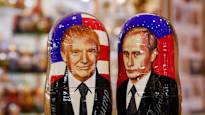MOSCOW Former President of Russia Dmitry Medvedev quickly challenged the Democratic presidential candidate on the messaging service X, formerly Twitter Horrible Harris with an election loss.
– The horror has passed. Allowing him to continue his catchy rant. The goals of the military special operation remain unchanged and will be achieved, Medvedev, acting as the deputy head of the National Security Council wrote.
Medvedev referred to Russia’s war of aggression in Ukraine and to Harris’s laughter, to which the Republicans Donald Trump seized during his election campaign. Trump’s intention was thus to mock his opponent.
In September, also the President of Russia Vladimir Putin said he hopes Harris wins because he has such a charming and infectious laugh.
Putin’s statement was, of course, his typical cynical sneer. Profiled as a war hawk from a gray technocrat, Medvedev didn’t even bother to hide his hostility.
Although led by Russia the more obviously Trump’s victory was hoped for, Russian politicians hardly open champagne bottles like when Trump won in 2016, at least not very openly.
Putin’s representative Dmitry Peskov represented a restrained line today, Wednesday.
Kremlin spokesman Peskov considered Trump’s speeches about quick peace to Ukraine as election campaigning and said that sometimes the tone of speeches changes after a victory.
Russia is monitoring the situation, Peskov said.
Russian foreign policy experts also threw ice in the hat at the press conference held in the premises of the state media company Rossija Segodnja.
Sharp changes in US relations with Russia and the war in Ukraine can hardly be expected, said the head of the World Policy Institute Andrei Sidorov from Moscow State University.
In Sidorov’s opinion, Trump and his vice presidential candidate JD Vance in their speeches, they did not take into account the other party’s, i.e. Russia’s, thoughts on the matter.
This is how Sidorov assessed Trump’s return to power:
The solution to the war in Ukraine is easier said than done. Russia now feels that it is in a war up to its neck, so Putin is pushing for very tough conditions just for a ceasefire.
For domestic political reasons, Trump is hardly able to make any concessions to Russia.
Before the elections, the Russian leadership emphasizedthat regardless of who sits in the White House in the future, the United States will remain Russia’s opponent.
Now the cautious line certainly reflects the fact that the Russian leadership does not want to jeopardize the opportunities that Trump’s return to the presidency might open up with their speeches.
The praise coming from Russia could be a burden for Trump. Democrats would at least grab it grudgingly.
In any case, it is to Russia’s advantage that Trump brings uncertainty to whether US support for Ukraine will continue.
Trump’s fractious style of policy-making also guarantees that the division in US domestic politics will become more acute. The Russian leadership can also consider that a desirable state of affairs.
On the other hand, the victory of Kamala Harris would hardly have eased the tensions in the US, especially since Trump would probably have questioned the election result.
Although the Russian leadership appeared restrainedthe country’s stock market expressed its satisfaction.
MOEX index of the Moscow Stock Exchange opened up on the rise – at its highest, it increased by 3.7 percent from the previous day’s decision.
The market therefore grew hopeful that Trump’s presidency could mean an easing of the sanctions pressure on Russia.
For ordinary citizens, the US elections were quite far away.
A relatively independent Levada center in an opinion poll before the elections, half of the respondents estimate that the election result has little importance for Russia.
A good third believed that Trump was a better option for Russia.
Kamala Harris of the Democrats was quite unknown to the Russians. This time, he will also stay that way.
Russian state television channels openly favored Trump during the election and annoyed Harris at every opportunity. The election coverage often followed the policies of the US conservative Fox News channel.
The US authorities, on the other hand, accused Russia of influence operations such as the distribution of fake videos and an attempt to finance conservative influencers to create online content toeing Russian lines.
However, Russia’s information influence projects were probably just a drop in the ocean. Such huge amounts of disinformation and different types of election financing in the US elections were rampant from behind.
